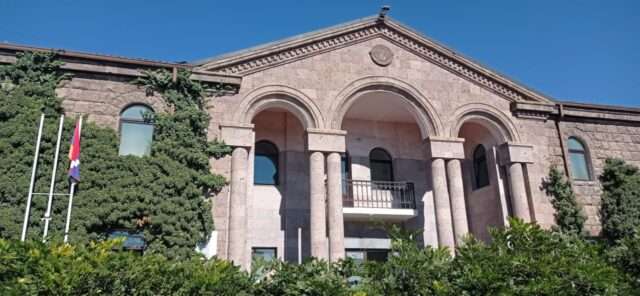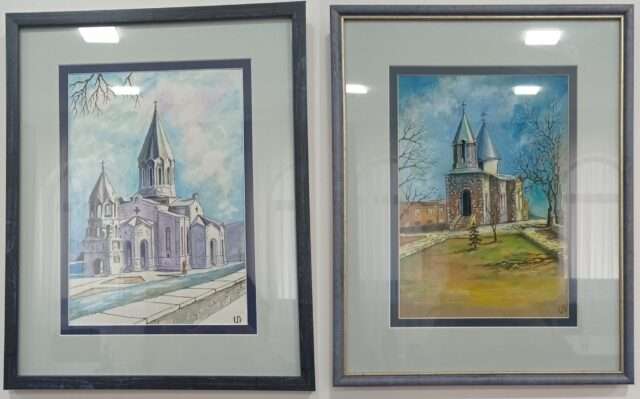
Geopolitical Report ISSN 2785-2598 Volume 25 Issue 1
Author: Silvia Boltuc
On October 30th, 2022, over 60.000 people gathered in Stepanakert, in the self-proclaimed Republic of Artsakh. Protesters clamoured for the right to self-determination and appealed to the Yerevan government and the international community asking Artsakh not to be ceded under the control of Azerbaijan.
The protesters who took to the streets in Stepanakert also appealed to Russia. Indeed, after the agreements of November 9th, 2020, Russian peacekeepers were deployed in the territories of Artsakh. Furthermore, starting from October 31st, 2022, Armenian Prime Minister Nikol Pashinyan, Russian President Vladimir Putin and Azerbaijani President Ilham Aliyev held trilateral talks in Sochi at the invitation of Moscow to settle the situation.
After Nagorno-Karabakh 2020 war, Armenia accused Azerbaijan of using phosphorus bombs, and the UN reported war crimes and the employment of Syrian mercenaries by the Azerbaijani side.
SpecialEurasia met with Sergey Ghazaryan, Permanent Representative of the Republic of Artsakh in Armenia, with whom we discussed how recent regional geopolitical dynamics in the Caucasus had influenced the current situation in Nagorno-Karabakh.
How is the current situation in Nagorno-Karabakh after the 2020 war?
“The situation is very difficult. After the 2020 war with the alliance of Azerbaijani and Turkish forces, Artsakh has lost many things: we had human, cultural, territorial and economic losses.
More than 70% of Artsakh’s territories are occupied now. The historical and cultural heritage of Artsakh that survived there over the centuries, in the XXI century, has just been destroyed.
Moreover, Azerbaijan uses several tools to push people to flee their homes. For example, it sabotaged gas supplies during the hard winter last year. All the constructions, such as hospitals and schools, couldn’t be operated. While all this happened, the international community saw and remained silent. Moreover, some of the European structures glorify Aliyev and buy gas from Azerbaijan. The Artsakh and Armenian rights are deprived right now.
We had to struggle for our physical existence. After the first Nagorno-Karabakh war, the Artsakh people wanted the normalisation of relations peacefully, but Azerbaijan refused. Hiding under the negotiation process, they were preparing themselves for war, and in 2020, it happened.
The Armenian side is somehow disappointed by the international community and organisations. For a long time, the Minsk group representing three countries, the US, Russia and France, which are security members of the UN, declared that there was no forced way to resolve this conflict, but Azerbaijan went this way. Moreover, it invited these representatives, and although they said this conflict had no military resolution, Baku solved it militarily. In this way, Azerbaijan showed disrespect to the international community and organisations.
It’s essential to say that Turkey has been part of this war. They brought mercenaries and terrorists from the Middle East into this conflict. Many high-level organisations have denounced the atrocities they committed, but it seems acceptable to the international community since there were no consequences for Azerbaijan or Turkey.”.
Does this mean that the international community, which suddenly is showing more interest, will not provide any military assistance to Artsakh in case of another escalation?
“When we speak about international assistance, we don’t mean only military aid. First of all, we refer to acting under international norms. All we see are double standards. Up to now it has already passed two and half years, and no international organisation has been involved in Artsakh. We should also consider that Azerbaijan puts pressure on them. In our opinion is not an acceptable situation. As I told you, Azerbaijan destroyed Armenia’s cultural heritage, such as these two churches; Although they survived many centuries, in the XXI century, they were destroyed.

People that have been captured during the war, living people, were beheaded, or Azerbaijani forces cut their ears and other cruelties. They were shooting everything on the ground and were sending these videos to those people’s family members. We have seen such cruelty only by the Islamic state. At the same time, we know that the government of Azerbaijan accept it. The international community welcomed Azerbaijan and its leaders, and no one spoke about these atrocities.”.
So, the international community didn’t push Azerbaijan to take accountability for these atrocities?
“Unfortunately, not. The international community is not reacting properly. They were closing their eyes on the international human rights of the Artsakh people. And whenever we ask why the independence of Kosovo is possible while not the independence of Artsakh, no one answers.”.
How do the people in Artsakh feel now after the West supported Ukraine while not supporting Artsakh during the war of 2020? How do the people of Artsakh feel about the Armenian government as we saw that the social media reacted very harshly to some statements of the current Armenian government?
“Referring to the first question, once more, we should speak about double standards. Concretely from the Ukrainian and Russian sides, we didn’t see such a level of atrocities and cruelties as the ones that happened in Nagorno-Karabakh, like the beheading of people.
As for our relations with the Armenian authorities, they are also experiencing a tough situation. They have been attacked, although there were a lot of calls and the Armenian Republic is internationally recognised. Azerbaijan is continuing to create tensions with Armenia. And the same happened with the Turkey side, which is also pressuring Armenia to accept Azerbaijani demands. So Armenia has a challenging situation too. And Azerbaijan is taking advantage of the fact that all its steps haven’t been adequately punished, and that’s why Baku is continuing.”.
Can you explain why Armenia has not recognised you as an independent state?
“Armenia said they do not recognise the Republic of Artsakh’s independence because this can damage the negotiation process, which might be a disrespectful approach towards the international community.”.
How is your government supporting the IDPs in Artsakh and the region’s economy?
“They are fulfilling different programs. The Republic of Armenia is the only one helping the displaced people living in Artsakh. As I have told you, no international organisation is doing any programs in the territory of Artsakh, only the Red Cross.
Almost 20.000 displaced people are now living in the territory of Armenia. The government of Artsakh is doing whatever it is possible to do now. But the issues to address are so many that it is impossible to resolve all the problems in the short term.”.
Do the international community support these people in the territory of Armenia?
“They supported, but not very much, during the war and shortly after.”.

Ruben Vardanyan, the Armenian-Russian billionaire, came to Artsakh and was appointed state minister. Do you think there is a possibility that other billionaires might come to Artsakh and economically support it?
“I should say that Artsakh has been helped only by the government of Armenia and the Armenian diaspora. Referring to Ruben Vardanyan, I can say that according to whatever Mr Vardanyan has said, the existence of Artsakh is dangered right now, and without Armenian Artsakh, the future of the republic of Armenia itself is unrealistic. Ruben Vardanyan is engaged in many Armenian worldwide programs, and he has much experience in different spheres and with relations with worldwide Armenian communities. As he has mentioned, he is going to do everything for Artsakh.”.
Do you think the diplomatic way is the only one to achieve peace? And what concessions would you make to achieve peace?
“We would like many problems would be solved diplomatically. Unfortunately, the experience showed that such hopes are just hurting us.
We had such hopes during the first war. With this hope, we negotiated, but the other side hid under the negotiation process while preparing for war. About the second question, the experience shows that if you have concessions only from one side, the other side sees this as a weakness. And it is going to put more strong pressure on you. And in reality, we do not have anything more to concede, actually the opposite.”.
So what is the probability of a military escalation, particularly now that Russia is stuck in Ukraine and there is a sort of vacuum in the Caucasus? In this case, how are you preparing for a war?
“As we see, there’s a lot going on in Artsakh and worldwide. Of course, in this situation is very difficult to guarantee our security by only relying on our power. As I have told you before, Turkey is involved in this conflict as well, and Ankara has vast military potential, but this doesn’t mean we will surrender. Erdogan’s wishes are becoming bigger and bigger. They are using different tools, starting from corruption to using terrorists. You all know that there are many cases in Europe of Azerbaijan which corrupted people. Whenever someone sees that using such tools is considered acceptable by the international community and organisations, they will take advantage of it. So they are taking advantage and see no reason to act differently.
Whenever you make concessions to the aggressor, you cannot find solutions.
The second issue is that if Artsakh loses, the whole civilised world will be defeated, the world that has the right to call itself ‘civil’.
We are on the first border of struggle, on the first line. It is a struggle for independence and democracy. The basis of our struggle is international law. We hope that the situation will change. Otherwise, in all the world, such a situation might happen very fast.”.
Do you think this is a clash between Christianity and Islam?
“In Sushi, we restored the mosque. If you look at the relations between Armenians and Iranians, you will see that we have no problems with Islam. Of course, there is an attempt from the Azerbaijani side to present the situation like that.”.



